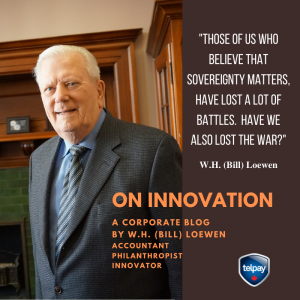Last Saturday, the Globe and Mail ran an article about large American firms lobbying the US government to discourage the new Canadian government from keeping its election promise to raise income from internet service providers who earn income from their users in Canada. (U.S. business groups claim Ottawa’s digital tax plan could imperil USMCA, ask White House to intervene, Nov. 16)
It took me back to to the 1970s and 80s when a phenomena called Trans Border Data Flow (TBDF) was a bit of a hot potato. Data processing service bureaux were thriving at that time, at least in terms of investment. Datacrown, Canada Systems Group, Computel and others with backers such as Crown Life, Stelco, Eaton’s and so on. They were boasting how they were going to grow into the lucrative US market. They had an industry association called CADAPSO – Canadian Data Processing Services Organization. I had lead a group of small firms by forming CICS – Canadian Independent Computer Services, in an effort to stop banks from moving into the data processing field. The two groups became rivals. I recall a dinner put on by the Ontario government to which I was invited as were many heads of the large data processors. We each had to introduce ourselves. The head of CADAPSO boasted that his organization represented 90 per cent of the revenues generated by the Data processing industry. I desperately wanted to say that our organization represented 90 per cent of the profits of the industry. As an out of town guest I felt I should mind my manners and passed the opportunity. It wasn’t that long until they had all disappeared and, as it happened, so did all their parent companies.
At the same time the Canadian telephone companies were building cross border communication facilities to make it easier to move data across the border. As described by a friend of mine “We have built the highways for our conquerors chariots”.
Some Canadians have long been concerned about the high degree of foreign investment in Canada. I had thought the data processing industry, being new and Canadian-owned at that time, should remain an exception to the many industries that were foreign-owned. Some of us tried but failed. Even when selling Comcheq I turned down an offer from ADP and sold to CIBC on terms that I hoped would see Comcheq remain Canadian-owned. I thought the banks were in the payroll business forever. How naïve I was! At the very first opportunity, CIBC sold to a US firm.
The federal government had, some time earlier, passed the Foreign Investment Review Act. Under that act, all larger corporations had to provide their annual Canadian financial statements. With that information it was easy to see the degree of control and even profits of foreign-owned businesses. Even then it was apparent that American-owned companies had higher levels of employment per million dollars of revenue in the US than in Canada. With open borders for movement of data there were many more opportunities to provide head office functions on one side of the border, exactly as the opponents of TBDF had predicted.
Today, US firms dominate the internet. Not only do they want all the resulting jobs, they want the revenue they generate in foreign countries to be free of any taxes imposed by those countries. Local companies such as Telpay generate employment, pay taxes on their profits and collect taxes on their sales and, for my part, I am happy to do so. To paraphrase Mae West, “I have not had to pay taxes and I have had to pay taxes. Paying taxes is better.” These US companies want none of that. They want a free ride in Canada. Any bets on whether they will get it?
Today’s mantra is cloud processing. Probably 90 per cent or more of Canadian cloud processing is done in the U.S. Where we go from there is anyone’s guess. Those of us who believe that sovereignty matters, have lost a lot of battles. Have we also lost the war?
“On Innovation” is a corporate blog by W. H. (Bill) Loewen, founder, Comcheq Payroll Services and Telpay Bill Payment Services, exploring the impact of current innovations in the financial services industry and reflections from his past 50 years of business experience. In his spare time, Bill likes to spend time with family and friends, play bridge, dabble with woodworking and is a passionate classical music lover.

